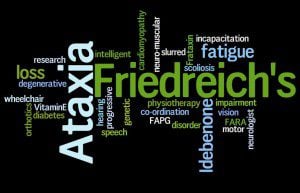
Note: May 21 is Friedreich’s Ataxia Awareness Day. Part of me is afraid that I share about my disability too much. I don’t want to be typecast as someone who only writes about his disability. However, it is the lens through which I see, every second of every day. To write personally and meaningfully, I have to mention it. FA is the elephant in my writer’s corner, and I will not pretend it isn’t there. I will stare that pitiful pachyderm down, because ignoring it is cowardly and, worse, inauthentic.
“…[W]e even boast of our afflictions,
knowing that affliction produces endurance,
and endurance, proven character,
and proven character, hope,
and hope does not disappoint…” Romans 5:3-5
I think it was windy that day. Fitting. The Louisiana sun was out, but the loud bluster kept most people indoors, uncommon for a not-too-chilly March afternoon. At fifteen, I was almost old enough to emerge victoriously from the suffocating and insecure swamp known as puberty. But not quite.
My dad reached for the handle to get out of his truck once we’d arrived at his workplace. Unbuckling the seatbelt on the passenger’s side slowly and with reservation, I blurted, probably unexpectedly, “So…I’m old enough now. Tell me what the name of the thing I have is.”
His hand stopped reaching for the door handle. He hesitated for only a second before he told me: “Friedreich’s ataxia.” After that, he opened the driver’s side door and walked into his office. The discomfort of that conversation had ended.
The “thing” I asked about was a shadowy but indelible part of me. Since I was eleven, I knew that I had something that affected my coordination and my ability to run. As a result, I stayed on the sidelines for most junior-high kids’ activities. I didn’t think that whatever the “thing” I had was obvious to others, but in fifth grade someone called me, “Cripple walk.” The teacher heard, and was furious at the name-caller. I was too confused to be upset about it. Did I really walk that differently?
Entering high school, I recognized the progression of my “thing”: running was not an option to me anymore, and neither was walking down stairs without a handrail. Rather than continue to be bounced around by an unknown and unseen force, I asked for the name of whatever it was that windy day in March.
Back then, in 2001, the Internet existed, though not as pervasively. I typed in “Friedreich’s ataxia” to my favorite search engine at the time, Ask Jeeves (RIP). After a spell-check, I found that Friedreich’s ataxia, or FA, is a recessive genetic disorder that causes the brain to produce nerve cells without frataxin, which normal nerve cells have. Frataxin moderates the amount of iron cells can carry, so without frataxin, nerve cells carry too much iron, and the excess incapacitates the entire cell.
Note 2: I am not a scientist, or someone with more than a mediocre knowledge of biology. This is as I understand it.
The last section of the article was the part I cared most about. It was called “Treatments.” There was no treatment. The article closed with: “People with FA require the full-time use of a wheelchair by the end of their teenage years.”
Reading that sentence as a 15-year-old was devastating. I expected to find out that some therapy or medication would be in store. I had even resigned myself to the fact that I may “walk funny” for the rest of my life. Learning that in a few short years I would lose all ability to independently get around was more devastating than my teenage brain could handle.
Before slaying the newly identified dragon that was my disorder, I had to lay to rest the familiar and safe cocoon of not knowing. That involved acknowledging that my childlike perception of God was not and was never strong enough. The absence of that God – who disappeared as my shadowy disorder suddenly became painfully clear – terrified me. It broke my heart.
Seeking a God who doesn’t only exist in naivety is a worthy challenge.
When I was 19, that search led me to a meeting of a Protestant group in college, visited by a faith healer. This guest speaker traveled the country and supposedly granted healings to those over whom he prayed. I was used to healing services–I’ve been to healing Masses, traiteurs and other types of faith healers, and even made a pilgrimage to Lourdes, France. My childhood was filled with anticipating miracles that never came.
But this time was different, I thought; same as I had each time. This healer was known throughout the country; my friend prepped me by reading accounts of Jesus healing people in the Bible. He ended with the Gospel of Matthew, Chapter 7, Verse 7, in which Jesus tells his followers to ask and it shall be given them, seek and they will find, knock and the door will be opened to them; my friend even said we’d go eat pizza after, because we’d have reason to celebrate.
Facing a slow but steady decline in my physical capabilities, most especially the submission to using a wheelchair full-time just a year earlier, I eagerly grasped at this hope of escaping the downward spiral and kicking my wheelchair to the curb. Like an arrogant gambler who thinks the hand he’s dealt is solid, I was all in. I was asking, knocking, and seeking. It was Jesus’ move next.
No miracle occurred that night. After the healer mumbled a few words while touching my forehead, he left. Then my friend asked me to try to stand on my own. After I tried and fell back in my seat, he asked me if I believed I was cured. Familiar with the rising disappointment of not getting a miracle, again, yet still acutely hurt, I could only reply, “I’d like to be.”
After the meeting, my friend didn’t feel like going to eat pizza in celebration anymore, so I went back to my apartment, alone and still in my wheelchair. Once again, the howling winds threatened to sink my dinghy-lifeboat. Once again, I had to redefine faith and acknowledge that I didn’t know who (or even if) God was. But battling this affliction over and over taught me that despite heartbreak and foreboding hopelessness, perhaps even in spite of myself, I would–aggravatingly–endure.
And enduring hardships may produce at first a tough callousness, but that may evolve into a kind of strength. That strength, wizened by constant batterings, may even produce a decent character. Or at least, that’s the goal. I haven’t arrived there yet, but I’m moving forward.
I’m no longer in the sheltered safety of ignorance. And I still sometimes get battered by chaotic winds. But I get up and move forward. That’s less grandiose than it sounds. Sometimes it looks like hardheadedness. Sometimes it looks like despair. Sometimes it looks like listlessness or surrender.
Or hope. Sometimes it looks like hope.













